- Home
- David McCullough
The American Spirit Page 3
The American Spirit Read online
Page 3
“All honor to Jefferson,” wrote Abraham Lincoln on the eve of the Civil War, “[all honor] to the man who, in the concrete pressure of a struggle for national independence by a single people, had the coolness, forecast, and capacity to introduce into a merely revolutionary document, an abstract truth, applicable to all men and all times.”
All honor to Jefferson in our own world now. We can never know enough about him. Indeed, we may judge our own performance in how seriously and with what effect we take his teachings to heart. When he wrote the Declaration of Independence he was speaking to the world then, but speaking to us also, across time. The ideas are transcendent, as is so much else that is bedrock to what we believe as a people, what we stand for, so many principles that have their origins here, with the mind and spirit of Thomas Jefferson. Sadly, too many today take for granted public schools, freedom of religion, freedom of speech, equality before the law, forgetting that these were ever novel and daring ideas.
Once on a summer evening in Washington, about a year ago, I stood on the Truman Balcony at the White House, that architectural supplement to the South Portico made by President Truman in the late 1940s, in keeping, as he explained to a critical press, with Jefferson’s designs for the University of Virginia.
Truman’s executive order desegregating the armed forces
It was President Truman, you will remember, who by executive order ended segregation in the armed services. On that evening, beside me, stood the highest ranking officer in the military services, General Colin Powell. We were looking across the Mall, past the Washington Monument to the Jefferson Memorial, which was just catching the last light of day. It is his favorite of all the memorials in Washington, the general told me. Then, slowly and with feeling he recited the line—“I have sworn upon the altar of God eternal hostility against every form of tyranny over the mind of man.”
The Declaration of Independence was not a creation of the gods, but of living men, and, let us never forget, extremely brave men. They were staking their lives on what they believed, pledging as Jefferson wrote in the final passage, “our lives, our fortunes, our sacred honor.” By honor they meant reputation, their good name. Their word, once given, would not be broken. It was their code of integrity, their code of leadership.
The year before his death, Jefferson presented to his granddaughter and her husband, Ellen and Joseph Coolidge, Jr., of Boston, the portable writing box he had used to draft the Declaration of Independence and while it was of no “particular beauty,” its “imaginary value,” he assured them, was bound to increase with years. And so it is with so much that is real from the past. There is no possible reckoning of the “imaginary value” of this great house, these lovely grounds, just as there is no possible reckoning of the creative energy of Jefferson’s mind or the enduring vitality of his high purpose, his faith in the people of America.
By reaching for the stars, Jefferson gave us all the impulse.
He liked to talk about the energy of an idea. At times he seemed all ideas, all energy. “It is wonderful how much may be done, if we are always doing,” he said. And as few men and women ever have, he was always doing for his country.
It is in that spirit that I welcome you, our new fellow Americans. The nation is the richer for you. I hope you will travel your new homeland from end to end, see as much of it as possible, read its history, enjoy its music, read aloud its poetry. I hope that in the spirit of Thomas Jefferson you will remain open to new ideas, prize tolerance and common sense and a love of the earth and its abundance.
Which Way Forward
UNION COLLEGE
Schenectady, New York
1994
Once, in 1779, even before there was a nation, nearly a thousand people of the community petitioned for a college here and this was something that had never happened before, the first popular demand for higher education in America. Think of that!
And listen, please, to this lovely item from the New York Evening Post, datelined Schenectady, February 24, 1795:
The gentlemen who were appointed by the inhabitants of the town of Schenectady to make application to the Regents of the University of the State of New York for collegiate powers in this town, have returned and assure us that the Regents have granted a charter for a college to be called Union. . . . The students of the Academy pleased with the information and sensible of the many and great advantages which will accrue for the western and northern parts of the state and to themselves in particular expressed their satisfaction on the occasion by illuminating the Academy Hall, which made a brilliant appearance, and greatly displayed the taste of the young gentlemen. The whole business was conducted with decency and good order.
Try to imagine the time and place. In 1795 the president of the United States was George Washington. Albany had yet to become the capital of New York. The Erie Canal was still thirty years in the future.
Historic ground: The design of this noble campus, by the French architect Joseph Jacques Ramée, dating from 1813, was not only the first architectural plan for a college campus anywhere in all of America, predating Jefferson’s design for the University of Virginia by six years, it represented a whole new outlook. The arrangement of buildings we see about us was a major event in American life and ideas—not the closed monastic seclusion of the medieval quadrangle, but an open plan, in keeping with the open spirit of the times and with the pioneering vision of Union’s legendary president, Eliphalet Nott. It was to be a place of learning open to the west, up the valley of the Mohawk, open to the wide world, open to those who wished to enter, open to ideas and innovation. We gather this commencement Sunday, let us remember, at the first interdenominational college in America. We gather where French was added to the curriculum when that simply wasn’t done, where engineering was included with the liberal arts as it had never been before on any American campus. We gather where the brave, indomitable Eliphalet Nott, in baccalaureate addresses, spoke out against slavery nearly a full half century before the Civil War.
Union College
Eliphalet Nott
From this campus, from other graduation ceremonies not greatly different from today’s, have come teachers, farmers, writers, bankers, geologists and astronomers, diplomats, attorneys, college presidents, merchants, politicians, physicians, and soldiers, many of whom counted significantly in American life, sometimes affecting the course of history or the reach of knowledge. One, from the Class of 1856, Captain Charles Elliott Pease, carried the terms of surrender from Grant to Lee at Appomattox. Another from the same class, George Hough, discovered six hundred new double stars. There was William H. Seward, Class of 1820, who became Lincoln’s secretary of state, and David Murray, from the Class of 1858, who became superintendent of educational affairs in the Japanese government. And if Chester A. Arthur, Class of 1848, is not one of our best-known presidents of the United States, he was unquestionably one of the tallest and best-tailored, a solid, well-meaning chief executive all-in-all, and the first ever to walk over the Brooklyn Bridge.
But what of the Class of 1994? What might be said of America, of the world you enter, on this 12th day of June, so near the start of a new century? Where do we stand?
The Cold War that began before many of your parents were born and that influenced American policy and American life more even than yet we know, is at last over. In 1953, at the beginning of the Cold War, in an astonishingly prophetic statement in his farewell address to the country, President Harry S. Truman said:
As the free world grows stronger, more united, more attractive to people of both sides of the Iron Curtain—and as the Soviet hopes for easy expansion are blocked—then there will come a time of change in the Soviet world. Nobody can say for sure when that is going to be, or exactly how it will come about, whether by revolution, or trouble in the satellite states, or by a change inside the Kremlin.
Whether the Communist rulers shift their policies of their own free will—or whether the change comes about in some other way—I have
no doubt in the world that a change will occur.
I have a deep and abiding faith in the destiny of free men. With patience and courage, we shall someday move on into a new era.
And so, some forty years later, that change has come and within the Soviet empire and with astonishing, unexpected suddenness. No one was quite ready for it, no one prepared, and now, as “the new era” opens, no one seems to know quite what to do.
In its approach to world problems, in its foreign policy, America seems oddly at sea. Without an enemy, some are saying, we have lost our sense of direction. The old certainties don’t serve any longer.
Meantime, the country is beset by crime, drugs, poverty, racial tensions, AIDS, illiteracy, the list grows longer by the day, while the horrors of Bosnia and Rwanda, the tensions over Haiti and Korea fill the headlines. There can be no knowing what to do abroad, other voices insist, until we know what to do at home.
We find ourselves worrying and taking stock as a nation, in ways we’ve not before. Who are we? What do we want? Which way forward? And what of our values? Is it only by our possessions that we wish to be known? Does what we have matter more to us than what we do?
No, I don’t think so. I think what most of us want—as most people everywhere want more than anything—is to be useful. This and to feel we belong to something larger than ourselves. What is needed now, now especially in this momentous change of scenes in world history, is a common understanding of what that larger something can be. What we Americans need above all is leadership to define the national ambition. And in this you of the Class of 1994 must play a part.
If we are beset by problems, we have always been beset by problems. There never was a golden time past of smooth sailing only. When Harry Truman spoke of the need for courage and patience in this new era, he was speaking from experience.
Once, in the last century, in the Cambria Iron Works at Johnstown, Pennsylvania, after working for months to build an unorthodox new machine for steel production, the engineer in charge, John Fritz, said at last, “All right boys, let’s start it up and see why it doesn’t work.”
It is with that very American approach to problems that I think we will find our course. Beware the purists, the doctrinaires. It has been by the empirical method largely, by way of trial and error, that we have come so far. America itself is an experiment and we must bear that always in mind.
We are here because of the grit and faith of the generations who have gone before. As Winston Churchill reminded us in a darker time, “We didn’t come this far because we are made of sugar candy.”
But there is no inspiring leadership any longer, you hear it said. This is hardly so. Consider the looming example of President Nelson Mandela, one of the most extraordinary figures of the whole century there at the vortex of one of the most important events of the century.
For twenty-seven years he was in prison. How many could have withstood that? How many could have survived, unbroken in body and spirit? For sixteen of those years, for as long as you who are graduating have been in school since kindergarten, he was denied newspapers or any access to radio or television.
Then in 1990 he was released and there he stood, straight and tall, and entirely clear of mind and purpose. And four years later, on May the 10th of this year, 1994, the whole world watched as he took the oath of office in Pretoria, ending 342 years of white domination, a symbol of liberation and hope for twenty million people living in the equivalent of the ninth century BC. And yes, we saw greatness, too, in the conduct and character of the white man he replaced, President F. W. de Klerk.
In our foreign policy as in our own national life we need less fanfare, less stagecraft and circumventing. We need to talk sense, to speak the truth, to work harder and stay faithful to our fundamental beliefs. We are, each of us, responsible for our own actions, but we also know it has been bedrock in our American creed, that without cooperation, without all of us working together, pulling together, we can’t make it. And we need you, you of the Class of 1994, all of you with all your gifts and energy, and your ideals. “Yes, I am an idealist,” said Woodrow Wilson. “That’s how I know I’m an American.”
On a rainy April night in 1917, President Woodrow Wilson went to Capitol Hill to ask the Congress for a declaration of war. Against all tradition, America was to become embroiled in conflict and resolution far beyond its borders. The American part in World War I proved decisive. And there could be no turning back, as Wilson knew—America had responsibilities in the world. With a second and still more terrible world war, American power and American responsibility grew greater by far. And again there could be no turning back. But power is not the point, responsibility is the point and at the heart of responsibility always are moral choices. In what we do, in what we say, what we stand for, we must feel, as did the founders of the nation, as did the founders of this college, that it is the example of America that matters.
So on you go with our heartfelt congratulations. You have good minds, now go out and use them. Make a difference. There’s more opportunity than ever, more than you’ve any notion. I am of a generation raised on the idea that we as a people can do just about anything we set our minds to. I still believe that.
Let’s do something about public education. Let’s stop the mindless destruction of historic America. Let’s clean up our rivers and skies, and while we’re at it, let’s clean up our language—private and public and on the airwaves. Let’s stop the dumbing and degrading and cheap commercial exploitation of American life.
Be generous—with your money, of course. But more important, give of yourself. Take an interest in people. Get to know people. Get to know what they’ve been through before you pass judgment. That’s essential.
Read history. By all means read history. We are all where we are, each of us, because others helped. As my friend Dr. Samuel Proctor, former pastor of the Abyssinian Baptist Church in New York, likes to say, “If you see a turtle sitting on a stump, you know it didn’t get there on its own.”
Read books. Try to understand the reason why things happen, why they are as they are. If you see only the surface phenomena, then the world becomes extremely confusing, ever more unsettling. But if the reasons are understood there’s a kind of simplicity that emerges.
Sometime, somewhere along the line, memorize a poem. Sometime, somewhere along the line, go out in a field and paint a picture, for your own pleasure. Sometime, somewhere along the line, plant a tree, buy your father a good bottle of New York state wine, write your mother a letter.
And sometime, somewhere along the line, do something for your country.
The Animating Spirit
DICKINSON COLLEGE
Carlisle, Pennsylvania
1998
We are of many backgrounds. We’ve come from many places, some very far, to celebrate achievement, high achievement old and new—the founding of Dickinson College more than two centuries ago and the commencement of its newest graduates, the great Class of 1998.
Dickinson College, let it be remembered, is older than the Declaration of Independence, older than the Constitution, older than the country. In 1773, this part of Pennsylvania was the western frontier. Philadelphia, the largest city in the colonies, had a population of maybe thirty thousand at most.
The Revolutionary War had only just ended by the time the college had a charter in 1783, and it was in Philadelphia that the first trustees gathered to take the oath of office.
The charter ceremony took place in the home of the president of the state of Pennsylvania, John Dickinson. He was made president of the board and it was for him, as you know, that the college was named. Slim as a needle, pale as a ghost, he was also, it happened, the largest donor.
James Wilson, prominent Philadelphia attorney and a signer of the Declaration of Independence, drew up the charter. Other trustees included clergymen, educators, politicians, mostly from here in Carlisle.
John Dickinson by Charles Willson Peale
Benjamin Rush by
Charles Willson Peale
But the driving force of the project, the animating spirit, was one of the most exceptional Americans of that exceptional age, Benjamin Rush of Philadelphia. Physician, professor, patriot, inexhaustible reformer, he set things in motion and set an example that couldn’t be more appropriate for this occasion or better medicine for the times we live in. Indeed, I hope I can leave you with the conviction that Benjamin Rush ranks among the outstanding Americans of all time.
Imagine a man who in one life served in the Continental Congress . . . signed the Declaration of Independence . . . served as a physician with Washington’s army
. . . who gave Thomas Paine the title for his fateful tract Common Sense
. . . who became, through his own writing, the most famous American doctor of his time
. . . who established the first free dispensary in America and devoted much of his own practice to caring for the poor
. . . who helped found Pennsylvania’s first society in opposition to slavery and in a passionate treatise denouncing slavery warned, “Remember that national crimes require national punishments”
. . . who championed better education for women, improved prison conditions, and opposed capital punishment
. . . who published the first chemistry textbook in America and wrote what may have been the first description ever in an American book of the game of golf.
The complete collected writings of Benjamin Rush fill forty-five volumes in the Pennsylvania Historical Society Library. His interests were all-encompassing—smoking chimneys and earthquakes, ballooning, old age, diet, clocks and microscopes, cooking, posture, mineral springs, good government, and sugar maple trees.

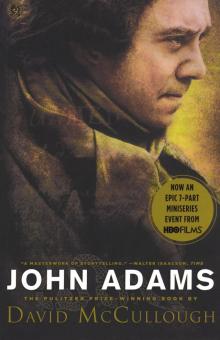 John Adams
John Adams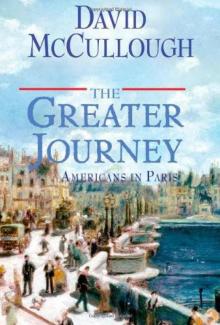 The Greater Journey: Americans in Paris
The Greater Journey: Americans in Paris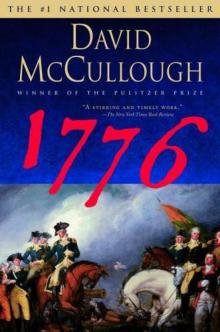 1776
1776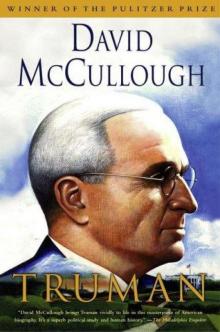 Truman
Truman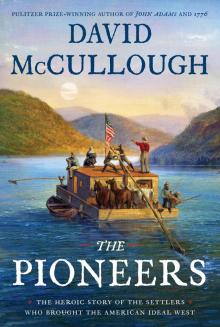 The Pioneers
The Pioneers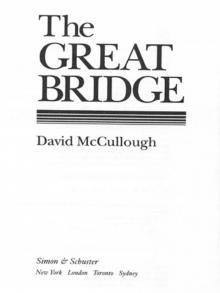 The Great Bridge: The Epic Story of the Building of the Brooklyn Bridge
The Great Bridge: The Epic Story of the Building of the Brooklyn Bridge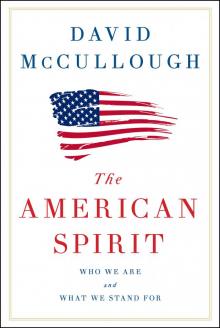 The American Spirit
The American Spirit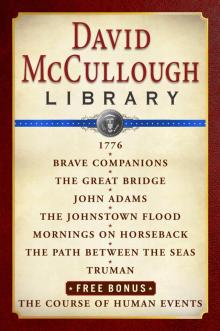 David McCullough Library E-book Box Set
David McCullough Library E-book Box Set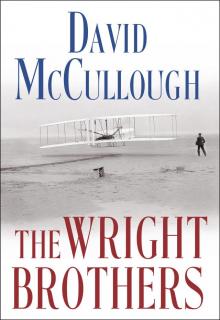 The Wright Brothers
The Wright Brothers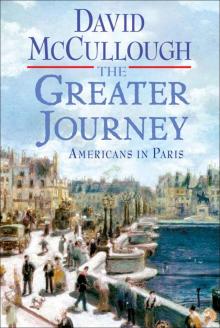 The Greater Journey
The Greater Journey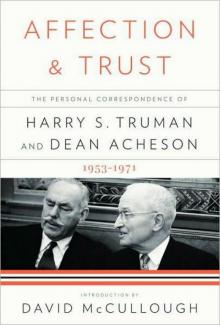 Affection and Trust: The Personal Correspondence of Harry S. Truman and Dean Acheson, 1953-1971
Affection and Trust: The Personal Correspondence of Harry S. Truman and Dean Acheson, 1953-1971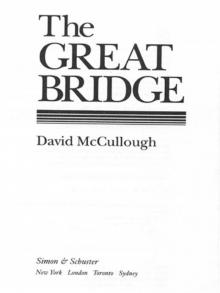 The Great Bridge
The Great Bridge